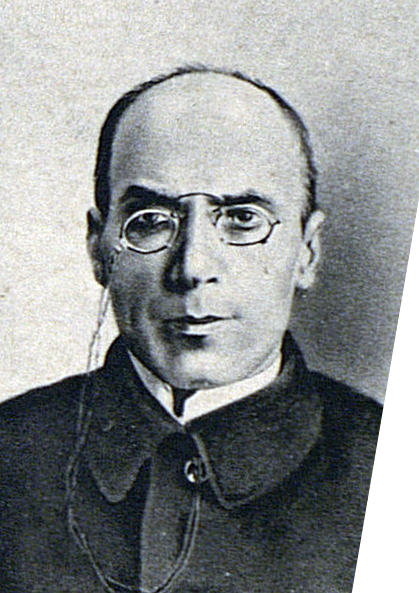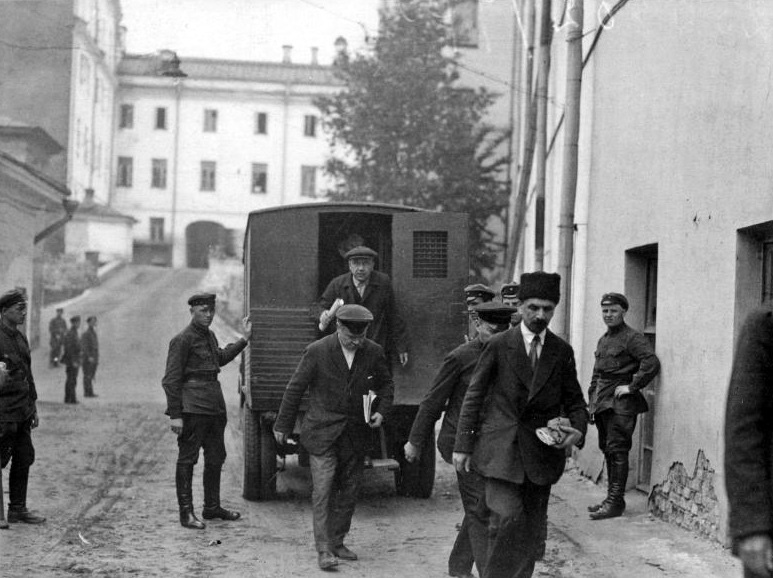|
Mikhail Vasilyev-Yuzhin
Mikhail Ivanovich Vasilyev-Yuzhin (Russian: Михаил Иванович Васильев-Южин; 10 November 1876 – 8 November 1937) was a Russian revolutionary, Old Bolshevik, Soviet statesman and jurist, and a victim of the Great Purge. Early career Vasilyev-Yuzhin was born into a working-class family in Pyatigorsk. He joined the Russian Social Democratic Labour Party in 1898 while he was an external student at Moscow University, where he graduated in 1901 from the Physics and Mathematics Faculty. When the RSDLP split, in 1903, he joined the Bolsheviks. Early in 1905, he was sent by Vladimir Lenin to Odessa to support the sailors who had mutinied on the ''Battleship Potemkin'', but did not reach the city until several days after the ''Potemkin'' had sailed. In the weeks preceding the Moscow uprising of 1905, he was one a troika at the head of the Moscow Bolshevik party committee, along with Virgil Shantser and Martyn Liadov, and was elected to the executive of the Mosco ... [...More Info...] [...Related Items...] OR: [Wikipedia] [Google] [Baidu] |
Saratov Oblast
Saratov Oblast (russian: Сара́товская о́бласть, ''Saratovskaya oblast'') is a federal subject of Russia (an oblast), located in the Volga Federal District. Its administrative center is the city of Saratov. As of the 2010 Census, its population was 2,521,892. Geography The oblast is located in the southeast of European Russia, in the northern part of the Lower Volga region. From west to east its territory stretches for , and from north to south for . The highest point of Saratov Oblast is an unnamed hill of the Khvalynsk Mountains reaching above sea level. The oblast borders on: * Volgograd Oblast to the south * Voronezh and Tambov oblasts to the west * Penza, Samara and Ulyanovsk oblasts to the north; * Kazakhstan ( West Kazakhstan Region) to the east Natural resources Of particular agricultural importance are valuable agricultural ordinary and southern chernozyom areas; chestnut soils are widespread. The oblast has many water resources: besi ... [...More Info...] [...Related Items...] OR: [Wikipedia] [Google] [Baidu] |
Russian Social Democratic Labour Party Members
Russian(s) refers to anything related to Russia, including: *Russians (, ''russkiye''), an ethnic group of the East Slavic peoples, primarily living in Russia and neighboring countries * Rossiyane (), Russian language term for all citizens and people of Russia, regardless of ethnicity *Russophone, Russian-speaking person (, ''russkogovoryashchy'', ''russkoyazychny'') * Russian language, the most widely spoken of the Slavic languages *Russian alphabet * Russian cuisine * Russian culture * Russian studies Russian may also refer to: * Russian dressing *''The Russians'', a book by Hedrick Smith * Russian (comics), fictional Marvel Comics supervillain from ''The Punisher'' series * Russian (solitaire), a card game * "Russians" (song), from the album ''The Dream of the Blue Turtles'' by Sting *"Russian", from the album '' Tubular Bells 2003'' by Mike Oldfield *"Russian", from the album '' '' by Caravan Palace * Nik Russian, the perpetrator of a con committed in 2002 *The South African ... [...More Info...] [...Related Items...] OR: [Wikipedia] [Google] [Baidu] |
Russian Revolutionaries
The Russian Revolution was a period of political and social revolution that took place in the former Russian Empire which began during the First World War. This period saw Russia abolish its monarchy and adopt a socialist form of government following two successive revolutions and a bloody civil war. The Russian Revolution can also be seen as the precursor for the other European revolutions that occurred during or in the aftermath of WWI, such as the German Revolution of 1918. The Russian Revolution was inaugurated with the February Revolution in 1917. This first revolt focused in and around the then-capital Petrograd (now Saint Petersburg). After major military losses during the war, the Russian Army had begun to mutiny. Army leaders and high ranking officials were convinced that if Tsar Nicholas II abdicated, the domestic unrest would subside. Nicholas agreed and stepped down, ushering in a new government led by the Russian Duma (parliament) which became the Russian P ... [...More Info...] [...Related Items...] OR: [Wikipedia] [Google] [Baidu] |
1937 Deaths
Events January * January 1 – Anastasio Somoza García becomes President of Nicaragua. * January 5 – Water levels begin to rise in the Ohio River in the United States, leading to the Ohio River flood of 1937, which continues into February, leaving 1 million people homeless and 385 people dead. * January 15 – Spanish Civil War: Second Battle of the Corunna Road ends inconclusively. * January 20 – Second inauguration of Franklin D. Roosevelt: Franklin D. Roosevelt is sworn in for a second term as President of the United States. This is the first time that the United States presidential inauguration occurs on this date; the change is due to the ratification in 1933 of the Twentieth Amendment to the United States Constitution. * January 23 – Moscow Trials: Trial of the Anti-Soviet Trotskyist Center – In the Soviet Union 17 leading Communists go on trial, accused of participating in a plot led by Leon Trotsky to overthrow Joseph Stalin's regime, and assassinate ... [...More Info...] [...Related Items...] OR: [Wikipedia] [Google] [Baidu] |
1876 Births
Events January–March * January 1 ** The Reichsbank opens in Berlin. ** The Bass Brewery Red Triangle becomes the world's first registered trademark symbol. * February 2 – The National League, National League of Professional Base Ball Clubs is formed at a meeting in Chicago; it replaces the National Association of Professional Base Ball Players. Morgan Bulkeley of the Hartford Dark Blues is selected as the league's first president. * February 2 – Third Carlist War – Battle of Montejurra: The new commander General Fernando Primo de Rivera marches on the remaining Carlist stronghold at Estella-Lizarra, Estella, where he meets a force of about 1,600 men under General Carlos Calderón, at nearby Montejurra. After a courageous and costly defence, Calderón is forced to withdraw. * February 14 – Alexander Graham Bell applies for a patent for the telephone, as does Elisha Gray. * February 19 – Third Carlist War: Government troops under General Pr ... [...More Info...] [...Related Items...] OR: [Wikipedia] [Google] [Baidu] |
Great Purge Victims
Great may refer to: Descriptions or measurements * Great, a relative measurement in physical space, see Size * Greatness, being divine, majestic, superior, majestic, or transcendent People * List of people known as "the Great" * Artel Great (born 1981), American actor Other uses * ''Great'' (1975 film), a British animated short about Isambard Kingdom Brunel * ''Great'' (2013 film), a German short film * Great (supermarket), a supermarket in Hong Kong * GReAT, Graph Rewriting and Transformation, a Model Transformation Language * Gang Resistance Education and Training, or GREAT, a school-based and police officer-instructed program * Global Research and Analysis Team (GReAT), a cybersecurity team at Kaspersky Lab *'' Great!'', a 2018 EP by Momoland * ''The Great'' (TV series), an American comedy-drama See also * * * {{disambig ... [...More Info...] [...Related Items...] OR: [Wikipedia] [Google] [Baidu] |
Soviet Jurists
The Soviet Union,. officially the Union of Soviet Socialist Republics. (USSR),. was a transcontinental country that spanned much of Eurasia from 1922 to 1991. A flagship communist state, it was nominally a federal union of fifteen national republics; in practice, both its government and its economy were highly centralized until its final years. It was a one-party state governed by the Communist Party of the Soviet Union, with the city of Moscow serving as its capital as well as that of its largest and most populous republic: the Russian SFSR. Other major cities included Leningrad (Russian SFSR), Kiev ( Ukrainian SSR), Minsk (Byelorussian SSR), Tashkent ( Uzbek SSR), Alma-Ata ( Kazakh SSR), and Novosibirsk (Russian SFSR). It was the largest country in the world, covering over and spanning eleven time zones. The country's roots lay in the October Revolution of 1917, when the Bolsheviks, under the leadership of Vladimir Lenin, overthrew the Russian Provision ... [...More Info...] [...Related Items...] OR: [Wikipedia] [Google] [Baidu] |
Soviet Politicians
The Soviet Union,. officially the Union of Soviet Socialist Republics. (USSR),. was a transcontinental country that spanned much of Eurasia from 1922 to 1991. A flagship communist state, it was nominally a federal union of fifteen national republics; in practice, both its government and its economy were highly centralized until its final years. It was a one-party state governed by the Communist Party of the Soviet Union, with the city of Moscow serving as its capital as well as that of its largest and most populous republic: the Russian SFSR. Other major cities included Leningrad (Russian SFSR), Kiev (Ukrainian SSR), Minsk (Byelorussian SSR), Tashkent (Uzbek SSR), Alma-Ata (Kazakh SSR), and Novosibirsk (Russian SFSR). It was the largest country in the world, covering over and spanning eleven time zones. The country's roots lay in the October Revolution of 1917, when the Bolsheviks, under the leadership of Vladimir Lenin, overthrew the Russian Provisional Government that ... [...More Info...] [...Related Items...] OR: [Wikipedia] [Google] [Baidu] |
Joseph Stalin
Joseph Vissarionovich Stalin (born Ioseb Besarionis dze Jughashvili; – 5 March 1953) was a Georgian revolutionary and Soviet political leader who led the Soviet Union from 1924 until his death in 1953. He held power as General Secretary of the Communist Party of the Soviet Union (1922–1952) and Chairman of the Council of Ministers of the Soviet Union (1941–1953). Initially governing the country as part of a collective leadership, he consolidated power to become a dictator by the 1930s. Ideologically adhering to the Leninist interpretation of Marxism, he formalised these ideas as Marxism–Leninism, while his own policies are called Stalinism. Born to a poor family in Gori in the Russian Empire (now Georgia), Stalin attended the Tbilisi Spiritual Seminary before joining the Marxist Russian Social Democratic Labour Party. He edited the party's newspaper, '' Pravda'', and raised funds for Vladimir Lenin's Bolshevik faction via robberies, kidnappings and p ... [...More Info...] [...Related Items...] OR: [Wikipedia] [Google] [Baidu] |
Shakhty Trial
The Shakhty Trial (russian: Ша́хтинское де́ло) was the first important Soviet show trial since the case of the Socialist Revolutionary Party in 1922. Fifty-three engineers and managers from the North Caucasus town of Shakhty were arrested in 1928 after being accused of conspiring to sabotage the Soviet economy with the former owners of the coal mines. The trial was conducted on May 18, 1928 in House of Trade Unions, Moscow. The Trial In 1928, the local OGPU arrested a group of engineers, including Peter Palchinsky, Nikolai von Meck and A. F. Velichko, in the North Caucasus town of Shakhty, accusing them of conspiring with former owners of coal mines, who were living abroad and barred from the Soviet Union since the Revolution, to sabotage the Soviet economy. The group was charged with a multitude of crimes, including planning the explosions in the mines, buying equipment from foreign companies that was not needed, incorrectly administering labor laws and safety ... [...More Info...] [...Related Items...] OR: [Wikipedia] [Google] [Baidu] |
Tambov Rebellion
The Tambov Rebellion of 1920–1921 was one of the largest and best-organized peasant rebellions challenging the Bolshevik government during the Russian Civil War. The uprising took place in the territories of the modern Tambov Oblast and part of the Voronezh Oblast, less than southeast of Moscow. In Soviet historiography, the rebellion was referred to as the ''Antonovschina'' ("Antonov's mutiny"), so named after Alexander Antonov, a former official of the Socialist Revolutionary Party, who opposed the government of the Bolsheviks. It began in August 1920 with resistance to the forced confiscation of grain and developed into a guerrilla war against the Red Army, Cheka units and the Soviet Russian authorities. The bulk of the peasant army was destroyed in the summer of 1921, smaller groups continued until the following year. It is estimated that around 100,000 people were arrested and around 15,000 killed during the suppression of the uprising. The Red Army used chemical weapo ... [...More Info...] [...Related Items...] OR: [Wikipedia] [Google] [Baidu] |






